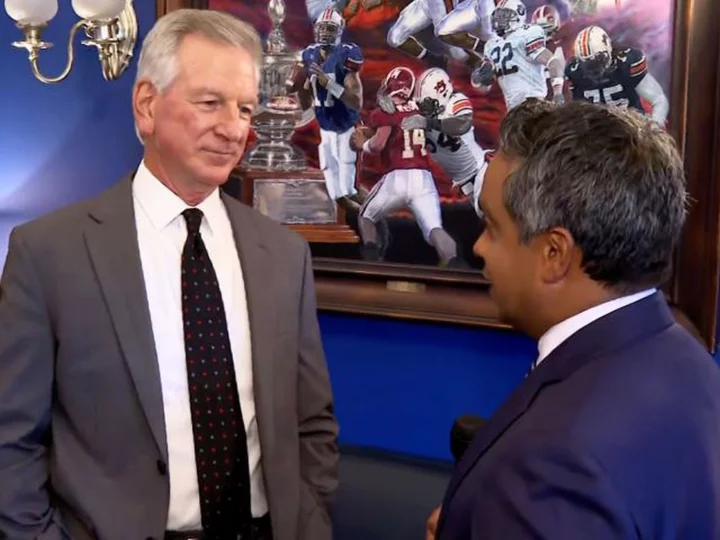The escalating feud between Democrats and Sen. Tommy Tuberville over the Alabama Republican's hold on roughly 300 military nominees could soon lead to an even riskier situation: Holding up the confirmation of the nation's highest-ranking military officer.
Gen. C.Q. Brown, who was nominated to be the next chairman of the Joint Chiefs of Staff, needs to be confirmed by the time the outgoing chairman, Gen. Mark Milley, is slated to leave his post when his term expires on October 1.
But senators from both parties are now signaling that the critical spot could get wrapped up in the larger battle: With Democrats eager to use the Brown nomination to pressure Tuberville to capitulate even as he insists he won't back down unless the Pentagon eliminates an abortion policy he argues is illegal.
Tuberville says that if Democrats try to use Brown's nomination to get him to back off, it won't work.
"Milley's going to have to work overtime then," Tuberville told CNN, calling on Senate Majority Leader Chuck Schumer to schedule a vote on the Brown nomination rather than use it as leverage in the battle over his holds.
"That shows you they're putting politics in front of readiness," Tuberville said.
But Schumer has refused to put individual Pentagon nominations on the floor, arguing that they have long been quickly confirmed in the Senate by voice votes and contending that giving into Tuberville would set a damaging precedent in the chamber. Moreover, Democrats argue that scheduling individual votes on the non-controversial nominations could eat up precious floor time, since the Senate would have to take time-consuming procedural votes to overcome a hold on each one.
And they believe it's up to Republicans to lean on Tuberville to change his approach.
"I still think that this needs to be sorted out among the Republicans," Sen. Mark Warner, a Virginia Democrat who chairs the Senate Intelligence Committee, said when asked if Brown's nomination and other major Pentagon promotions should move individually.
Sen. Tammy Duckworth, an Illinois Democrat who sits on the Senate Armed Services Committee, suggested that Democrats "hold off" on the Brown nomination.
"Because it's not just about the chair of the joint chiefs, right? It's about all these positions," she said.
Democrats believe that the growing pressure will ultimately force Tuberville to relent and allow the Senate to quickly confirm the stalled nominees by voice vote. And if it doesn't, they say, Tuberville will be blamed for preventing the confirmation of perhaps the nation's most important military position at a time of rising threats to the United States' security.
"Bottom line: This is an outrage, what he's doing," said Senate Majority Whip Dick Durbin of Illinois. "It affects the entire military. If we are asked to go through these nominees individually for promotions, we'll run out the calendar this year."
While Senate GOP Leader Mitch McConnell and other top Republicans have expressed their opposition to Tuberville's tactics, they have not leaned on the Alabama senator privately to back off. Indeed, Tuberville says he didn't get any calls from top Pentagon brass or GOP leaders over the five-week recess urging him to change his approach.
Moreover, Republicans who are sympathetic to Tuberville note that Milley was confirmed 89-1 by a roll-call vote in 2019, and say the same could happen for Brown. (Milley's predecessor, Gen. Joseph Dunford, was confirmed by voice vote.)
Plus Republicans say that Schumer and Democrats complain about a lack of floor time after only just returning from a five-week summer recess -- all the while keeping the Senate in session just Tuesday to Thursday on other weeks. They say the Senate can easily confirm the most critical nominees if Schumer were to schedule floor time for them -- or perhaps work on some Fridays.
"The reason why we are where we are is [Schumer] refuses to use the tools that he has to move these high-level military noms," Sen. John Cornyn, the Texas Republican, told CNN. "Sen. Tuberville's using the tools that are available to any United States senator, and that is to deny consent, but Sen. Schumer can always trump that. He just refuses to do so because he likes the political narrative."
Sen. Roger Wicker, the top Republican on the Senate Armed Services Committee, is uneasy about Tuberville's tactics, though he acknowledged he hadn't spoken to him during the summer recess.
"I think the majority leader should take the chairman of the Joint Chiefs of Staff nomination to the floor, as we do top Cabinet officials," the Mississippi Republican told CNN on Tuesday.
Asked about the other stalled nominees, Wicker only said: "I hope we can resolve the issue."
But there's clear unease in the GOP ranks.
"We've got to solve it," said Sen. Thom Tillis, a North Carolina Republican. "We've got too many positions up."
Senate GOP Whip John Thune added: "I'm hoping they can figure something out -- a solution. Obviously, we want to get a lot of those military leaders confirmed."
Tuberville says there's one way to resolve the impasse: Have the Pentagon scrap its policy providing a travel allowance for troops and their families who must travel to receive an abortion because of the state laws where they are stationed. Tuberville argues the policy is illegal and should be up for a vote in Congress, while Pentagon officials have pointed to a Justice Department memo that says the policies are lawful.
"If I thought I was really harming our military, I wouldn't be doing this," Tuberville told CNN. "But I'm not."
Tuberville said that he's been told by military officials that the duties left by vacant positions will be fulfilled, downplaying concerns that some military officers would have to do double duty to keep the nation safe.
"I'm not budging," he said Tuesday.









